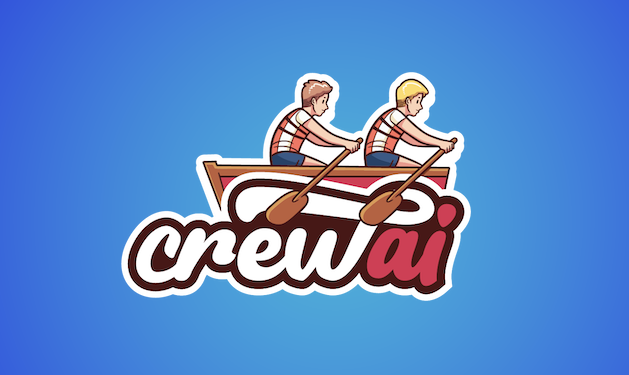CrewAI as Your AI Agent
What is CrewAI
- CrewAI is an open-source framework for orchestrating and collaborating with multiple AI agents.
- It allows you to create different AI agents, each with its own role and capabilities.
- These agents can then work together to achieve complex tasks, similar to how a crew works on a ship.
- This framework is often used for research and development in multi-agent AI systems.
- You can find more information about CrewAI the framework on its GitHub page: https://github.com/joaomdmoura/crewAI ![[/assets/img/headers/crewai-cover.png]]
Key features
1. Role-Based Agent Design: This allows you to define specific roles, goals, and tools for each individual AI agent. Think of them as crew members with specialized skills contributing to a common goal.
2. Autonomous Inter-Agent Delegation: Agents can communicate, share information, and autonomously delegate tasks among themselves. This streamlines problem-solving and allows for dynamic task distribution.
3. Flexible Task Management: You can design tasks with custom tools and dynamically assign them to specific agents based on their expertise. This ensures the right tool for the job gets used.
4. Processes-Driven: Currently, CrewAI supports sequential and hierarchical workflows, like following a set of instructions or a decision tree. More complex processes like consensual and autonomous are under development.
5. Local Model Integration: You can integrate pre-trained AI models like Ollama into CrewAI for specific tasks or data privacy needs.
6. Open-Source: CrewAI is built with an open-source approach, allowing for community contributions and customization.
Advantages of CrewAI:
- Flexibility: Offers a balance between the ease of building conversational agents and the structure of process-driven approaches.
- Adaptability: Dynamic processes allow for seamless integration into development and production workflows.
- Collaboration: Enables teamwork among AI agents, enhancing efficiency and tackling complex challenges.
| Feature | CrewAI | AutoGEN |
|---|---|---|
| Philosophy | Process-driven, structured workflows | Emergent behavior, collaborative |
| Agent Roles | Explicitly defined with specific capabilities | Dynamically assigned based on task requirements |
| Task Management | Manually designed and assigned | Agents negotiate and select tasks themselves |
| Control & Predictability | High, suitable for complex workflows | Lower, more adaptable |
| Learning & Adaptation | Less emphasis on on-the-fly learning | Agents can learn and adapt based on interactions |
| Ease of Use | Requires more upfront planning | Easier to start with, but may be complex for specific tasks |
| Open Source | Yes | Yes |
| Best for | Structured workflows, clear roles, predictable outcomes | Flexible, adaptable systems, collaborative problem-solving |
Getting Started
1. Installation
1
pip install crewai langchain_community langchain
The example below also uses DuckDuckGo’s Search. You can install it with pip too:
1
pip install duckduckgo-search
2. Setting Up Your Crew
1
2
3
4
5
6
7
8
9
10
11
12
13
14
15
16
17
18
19
20
21
22
23
24
25
26
27
28
29
30
31
32
33
34
35
36
37
38
39
40
41
42
43
44
45
46
47
48
49
50
51
52
53
54
55
56
57
58
59
60
61
62
63
64
65
66
67
68
69
70
71
72
73
74
75
76
import os
from crewai import Agent, Task, Crew, Process
os.environ["OPENAI_API_KEY"] = "YOUR_API_KEY"
# You can choose to use a local model through Ollama for example. See ./docs/how-to/llm-connections.md for more information.
# from langchain_community.llms import Ollama
# ollama_llm = Ollama(model="openhermes")
# Install duckduckgo-search for this example:
# !pip install -U duckduckgo-search
from langchain_community.tools import DuckDuckGoSearchRun
search_tool = DuckDuckGoSearchRun()
# Define your agents with roles and goals
researcher = Agent(
role='Senior Research Analyst',
goal='Uncover cutting-edge developments in AI and data science',
backstory="""You work at a leading tech think tank.
Your expertise lies in identifying emerging trends.
You have a knack for dissecting complex data and presenting actionable insights.""",
verbose=True,
allow_delegation=False,
tools=[search_tool]
# You can pass an optional llm attribute specifying what mode you wanna use.
# It can be a local model through Ollama / LM Studio or a remote
# model like OpenAI, Mistral, Antrophic or others (https://python.langchain.com/docs/integrations/llms/)
#
# Examples:
#
# from langchain_community.llms import Ollama
# llm=ollama_llm # was defined above in the file
#
# from langchain_openai import ChatOpenAI
# llm=ChatOpenAI(model_name="gpt-3.5", temperature=0.7)
)
writer = Agent(
role='Tech Content Strategist',
goal='Craft compelling content on tech advancements',
backstory="""You are a renowned Content Strategist, known for your insightful and engaging articles.
You transform complex concepts into compelling narratives.""",
verbose=True,
allow_delegation=True,
# (optional) llm=ollama_llm
)
# Create tasks for your agents
task1 = Task(
description="""Conduct a comprehensive analysis of the latest advancements in AI in 2024.
Identify key trends, breakthrough technologies, and potential industry impacts.
Your final answer MUST be a full analysis report""",
agent=researcher
)
task2 = Task(
description="""Using the insights provided, develop an engaging blog
post that highlights the most significant AI advancements.
Your post should be informative yet accessible, catering to a tech-savvy audience.
Make it sound cool, avoid complex words so it doesn't sound like AI.
Your final answer MUST be the full blog post of at least 4 paragraphs.""",
agent=writer
)
# Instantiate your crew with a sequential process
crew = Crew(
agents=[researcher, writer],
tasks=[task1, task2],
verbose=2, # You can set it to 1 or 2 to different logging levels
)
# Get your crew to work!
result = crew.kickoff()
print("######################")
print(result)
Examples
You can test different real life examples of AI crews in the crewAI-examples repo:
